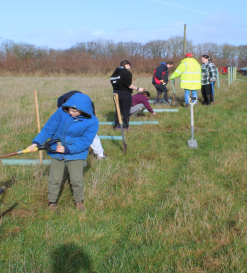Scouts, sloes and Spring
We welcomed the Scouts from the Levels Group on the 10th February for our final planting of the winter. The previous few days had been wet after a period of relatively dry weather but Saturday was a sunny warmish day.

To begin we gave them an explanation about the essential nature of tree planting in today’s Britain and especially on the hills around the Somerset Levels and Moors. They then worked very hard, including planting oaks and small-leaved lime saplings on the difficult steep slope to the north of the site in an area of woodland we have protected from rabbits and deer, and planting a mixture of trees in the young woodland we planted in 2021 to compensate for those trees and shrubs that did not survive (about 10% of those planted). Here are a couple of pictures - notice the blue sky! Now for a mention of the first blossom of this year. The picture shows a vigorous blackthorn shrub (Prunus spinosa) in flower. The normal flowering period for blackthorn is March -April. However in this mild part of the country, and with ever increasing average temperatures, flowering can now be expected early. However 10 February is very early. The flowers will lead to a small plum like fruits that some of you will know as Sloes. Sloes are inedible, being full of bitter chemicals called tannins. So are cider apples and pears but when fermented produce a very tasty product. If sloes are steeped in gin for a long time it makes a reasonable drink. This reminds me of something I heard once about Canada geese. A wildfowler said that Canada geese are so inedible that the only way to cook them is to boil them for a long time with two large stones, throw away the goose and eat the stones. I am sure devotees of Sloe gin think it’s great- so no offence.As Spring is upon us it has been noticed that along the edge of our woodland the bluebells are sprouting, those of you who walk there might like to note the first time you see bluebells in flower and leave a message on our website (currywoodsconservationtrust.com). Although increasing average temperatures are generally a negative trend this is not so for the trees on the Trust land paradoxically they will work harder for all of us and protect us from climate change better when temperatures are warmer. This is because they come into leaf earlier and take more carbon dioxide from the air and more water from the soil for more months than they use to in the past. If the world stopped deforestation and planted millions more trees we could get to a point where we stopped the increase of carbon dioxide in the atmosphere and slowed sea level rise. Somebody said to me last week, “if only every village would do what you are doing in Curry Rivel to fight climate change”.I leave you with that thought and thanks again to the Scouts for their cheerfulness and hard work - well done.


